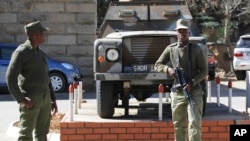The African Union (AU) warned leaders in Lesotho’s coalition administration that the organization has zero tolerance for the forceful removal of governments on the continent.
Lesotho's prime minister asked that peacekeepers be sent to his country following an apparent coup attempt over the weekend.
AU Deputy Chairman Erastus Mwencha said the organization is monitoring the ongoing peace negotiations between rival groups in the Lesotho government, currently being mediated by South African President Jacob Zuma.
Zuma is backed by the Southern African Development Community (SADC) to help resolve the impasse that led to the alleged attempt to overthrow Prime Minister Thomas Thabane’s government.
“As AU we have taken a stand as is well known that we cannot tolerate any unconstitutional means of changing government,” said Mwencha.
He said Thabane and his deputy Mothetjoa Metsing are in South Africa for peace negotiations and the AU is hopeful the talks will help resolve the political crisis.
“We have already issued a statement urging the parties to sit down and be able to solve their problems amicably, using the instrument that the country has,” said Mwencha.
He applauded the efforts of Zuma to help resolve the crisis and for a quick return to constitutional order.
“We hope that the process that has been initiated under the aegis of SADC would bear fruit. So we are now watching to see the next move and we hope this initiative would succeed and Lesotho can avert plunging itself into a crisis,” said Mwencha.
There were calls for a military intervention to restore law and order following the alleged attempt to overthrow the coalition government in Maseru.
But Mwencha rejected those calls, saying the peace negotiations should be allowed to continue in order to craft a solution.
“You cannot talk about a military intervention when the parties are talking and the coup has not happened. What we see is a process not going well…I don’t think we should jump into saying let’s send a force. Because one of the principles that AU ensures is let’s really find amicable solutions to conflict,” said Mwencha. “In the backbone of our intervention, force should not be the first option, but does not mean we tolerate any situation.”
Mwencha said the talks should be allowed to continue for a period of time in order for a lasting solution to be found to end Lesotho’s political leadership disagreement.







